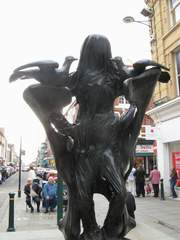W H Davies ... The Forsaken Dead
This poem appeared in New Poems, published in 1907.
Reading the poem you get the impression that it refers to an actual village, recently abandoned. But if so I have not yet been able to identify the village. It seems to have been an industrial village, the mills now empty, where the village people demanded a fairer sharer of the profits and were forced to leave in an impoverished state when the owner laid them off rather than accede to their demands.
If it was a real village then there are several ways in which W H Davies may have become aware of it:
· He may have read about it during one of his many visits to the local library.
· He may have passed through the village on his travels as a vagrant in southern Britain and the English midlands.
· He may have been told about it at a lodging house by one of the gridlers, pedlars, or downrighters whose company he shared.
The Forsaken Dead
What tyrant starved the living out, and kept
Their dead in this deserted settlement?
There is no voice at home, no eyes to look
Down from their windows on these gardens wild;
A tyrant hath refused his people work,
Since they had claimed a right to share his spoils,
And they have left their dead forsaken here.
Here will I sit upon this fallen tree,
Beside these ancient ruins, ivy-
Where Nature makes green mosses ooze and spread
Out of the pores of their decaying walls ―
Here will I sit to mourn that people gone.
Where are they gone that there's no maiden left
To weep the fall of this sweet village lost,
Down where its waters pass the empty mills?
No living thing except one tethered lamb,
That hath been crying full an hour in vain,
And, on that green where children played their games,
Hath browsed his circle bare, and bleats to see
More dewy pastures all beyond his reach.
Where is maid Margaret, whom I saw crowned
Queen of the May before so many eyes?
And scornful Maud, of her rare beauty proud ―
That cruel rose bud, with her close hard heart,
Between whose folds no mercy drop could lodge:
And where the men who threw the hammer's weight,
And leapt this common but three moons ago
When unto heaven they sent a deafening shout
Like wild Pacific, when he leaps and falls
At Raratonga, off a coral reef:
Then, in Life's glorious deep they swam and laughed,
And felt no nameless substance touch their limbs
To make them sick with dread of things unseen.
Some other tyrant, in some other shire,
Will drive his people forth, and they will come
Hither, to be this other tyrant's slaves.
Then back, ye famished strangers, or haste on:
There is no joy here, save in one short change;
Be warned to see these dead forsaken here.
Had they no dreamer here who might remain
To sing for them these desolated scenes?
One who might on a starvèd body take
Strong flights beyond the fiery larks in song,
With awful music, passionate with hate?
Were I that bard, and that poor people mine,
I would make strangers curse that tyrant's day:
Would call on Sleep, compeller of strange dreams,
Who leads the unbeliever to the Heaven he doubts,
And makes a false one fear the Hell he scorns –
Would call on Sleep to bring him ghastly dreams,
And haunt that tyrant's night without repose.
